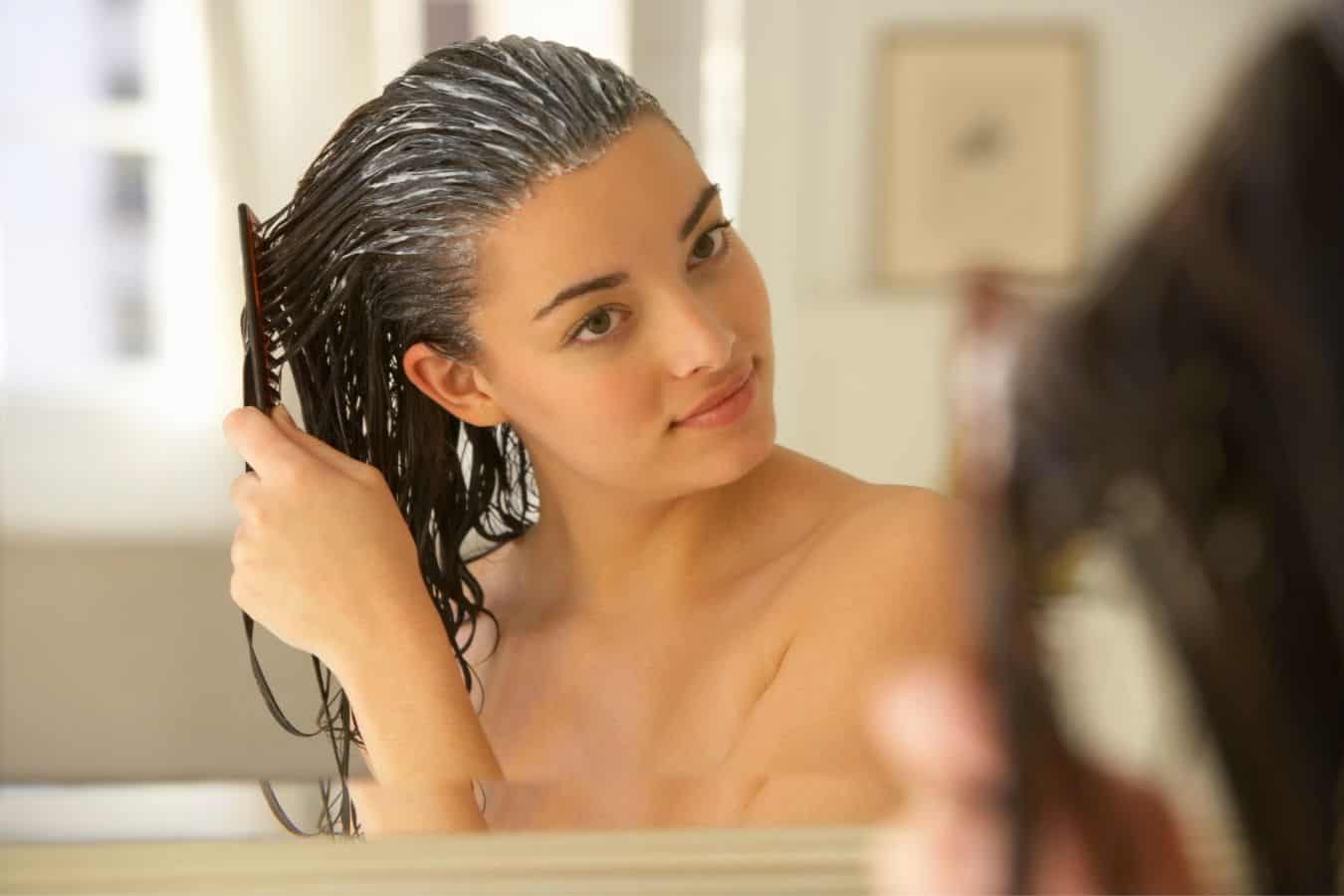A deep conditioning treatment is an excellent way to hydrate and improve hair condition. But what exactly is a deep conditioning treatment and do you need one? Let’s find out.

A deep conditioning treatment is exactly how it sounds. It’s essentially a hair mask that provides deeper nourishment and helps to reverse damaged hair. Unlike a typical conditioner, this deep conditioning treatment is left for an hour or more at a time.
This gives it enough time to coat the hair strands and replenish lost moisture. Deep conditioners can be used on all hair types, but they do work very well when used on dry, thick, or damaged hair.
This post contains affiliate links and we may earn if you click on them (at no extra cost to you). Please read our full disclosure policy here.
Signs You Need To Deep Condition
There may be some very clear warning signs that your hair is seriously lacking moisture and needs deep conditioner. However, there are also some less obvious signs to consider as well.
Remember that everyone can benefit from one of these treatments, regardless of whether your hair appears dry or healthy.
Signs your hair may need deep conditioning:
- Strands break or snap off
- Exposure to repetitive heat styling tools or chemical dyes
- Feels weak or brittle
- Itchy, dry, or flaky scalp
- Feels dry or rough to the touch
- Unruly frizz
- Gets tangled very easily
Read more about: How To Tell If Your Hair Is Damaged
Benefits of Deep Conditioning?
There are so many incredible benefits to using deep conditioners. And while it is often viewed as an extensive treatment for damaged locks, deep conditioners can actually be used by all hair types. Here are some of the key benefits:
Increases Elasticity
The elasticity of your hair is a good indication of how healthy it really is.
Hair that keeps snapping or breaking off is in need of moisture. Using a deep conditioner once a week can help to restore moisture to the hair shaft, making your strands stronger and less prone to breakage.
Repairs Damaged Hair
While there is no quick fix to reversing hair damage, a regular deep condition can make a remarkable difference.
Damaged hair needs more than just regular shampoo and conditioner. It needs intense hydration.
While some conditioners are thin and can slide off the hair easily, a deep conditioning treatment will be thicker and more nourishing.
As some deep treatments are made with penetrative oils such as olive oil and coconut oil, this ensures that the hair strands retain that essential moisture.
Increases Shine
When your hair begins to look dull or limp, that’s a key sign that you are lacking moisture.
There are many causes of this: weather damage, heat damage, over-styling, and general wear and tear. Most people will experience this from time to time.
That’s when a deep conditioner can restore that lost shine and make your locks look healthier. Smooth, shinier hair is usually easier to manage and style.
Improves Texture
Hair can become drier, rough, frizzy, and unmanageable over time.
This is a result of a lack of moisture and general damage overall.
Many deep conditioning treatments will include nourishing oils that will penetrate the hair strands, making them healthier and stronger.
This makes hair more manageable and should feel noticeably softer to the touch.
Also Read: The Best DIY Pre-Poo Recipes For Damaged Hair
What Is Involved In A Deep Conditioning Treatment?

To put it simply, a deep conditioning treatment promotes intensive hydration. While your everyday conditioner will help to improve the condition of your hair and reduce tangles, it may not be enough to repair and protect.
The first step to deciding what deep conditioning treatment is best for you is to figure out what your hair needs are.
For instance, if your texture is thick and coarse, then you will benefit from using a thicker oil such as olive oil.
If your hair is thinner and limp, then using a lighter oil or product will be a more suitable option.
The main goal is to not weigh your hair down or make it appear greasy, which can often happen when using a product that isn’t suitable for your hair type.
Our Favorite Deep Conditioners
The following deep conditioners are not only incredibly hydrating, but they are also free from sulfate, silicone, and drying alcohols. This means that they are Curly Girl approved in case you were wondering!
Best to use once a week or as per your needs.
Garnier Ultimate Blends Hair Food Banana 3-in-1
This 3-in-1 mask by Garnier is a popular deep conditioner amongst the Curly Girl community for several reasons. It contains 98% natural ingredients, so it won’t weigh your hair down or leave it feeling dried out from chemicals.
This product consists of a unique blend of banana and shea butter which work in combination to deep condition your hair whilst repairing dry damaged hair.
It’s also a very affordable option.
Curls Blueberry Bliss Hair Mask
This deeply penetrating blueberry bliss hair mask by Curls is made of a blend of natural ingredients including blueberry extract, chamomile extract, and aloe leaf juice.
This is viewed as a luxury mask intended to repair dry hair and restore curls to their former condition. It often works best when used once a week.
Shea Moisture Black Jamaican Hair Mask
This Jamaican black castor oil hydrating mask is another very popular choice because it contains mostly natural ingredients, including organic shea butter and apple cider vinegar.
It is suitable for natural hair as well as color treated hair. This hydrating mask aims to restore split ends, protect from further damage, and strengthen weakened strands.
As I Am Hydration Elation Intensive Conditioner
The Hydration Elation Intensive conditioner by As I Am contains a blend of green tea, lemon, sugar cane, and coconut oil for optimal hydration.
Coconut oil has the ability to penetrate the hair shaft, thereby offering deep intense moisture.
This naturally beneficial formula is suitable for all hair types.
DIY Treatments
There are also some natural hair masks that you can make at home. They are cost-effective as you may already have the ingredients in your fridge and cupboards.
Olive Oil And Honey
Olive oil and honey is a great treatment for thicker locks as it has the ability to penetrate the hair strands.
Combine ¼ cup of olive oil with a ¼ cup of honey and stir it to make a smooth mixture. Apply all over and proceed to cover your head with a cap or bag to generate some heat. After 30 minutes, you can rinse it off and wash your hair as usual.
Warm Coconut Milk
Coconut milk is an incredibly moisturizing hair treatment that promotes hair growth.
Simply heat up about 1 cup of coconut milk in the microwave and apply it all over the hair. Use a plastic cap for best results.
Leave it on for at least 30 minutes before rinsing it off.
Your hair should appear healthier, shinier, and conditioned.
Also Read: [2021 updated] The 12 Best Shampoos For Soft Water
How Often Should You Use Deep Conditioner?
This is a common question that often gets asked but there is no clear answer as it depends on your individual needs. For some people with extremely dry hair, it may be necessary to replace their everyday conditioning product with a deep conditioning product.
For others, using a deep conditioner more than once a week is unnecessary and could lead to moisture overload. Getting the right balance between moisture and protein is important.
For many people, once a week is sufficient enough to reap the benefits.
What Is The Difference Between A Protein Treatment And Deep Conditioning Treatment?
Protein treatments are very different from deep conditioners.
A deep conditioner is used to hydrate dry hair and keep it in good condition. This means you can do it once or twice a week.
Protein treatments help to repair the integral structure of hair, often caused by chemical damage or heat damage. This is different from a moisturizing treatment which helps to soften hydrate your hair.
A protein treatment should only be used every 4 to 6 weeks as it could lead to protein overload.
This is particularly beneficial to those who have high porosity hair. As stated, it should also be used on color treated hair or chemically processed hair as the hair can become dull and limp over time.
Often, a deep conditioning treatment will be used after a protein treatment to ensure the hair maintains its strength and moisture.
Disclaimer: This site is not intended to provide professional or medical advice. All of the content on LovedByCurls.com is for informational purposes only. All advice should be followed at your own discretion. Ingredients may change at any time so always check the product label before using. Check our full disclaimer policy here.




